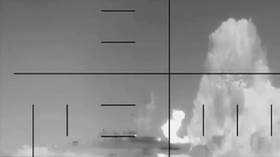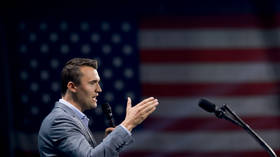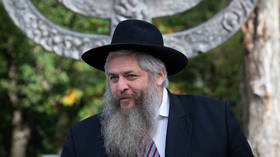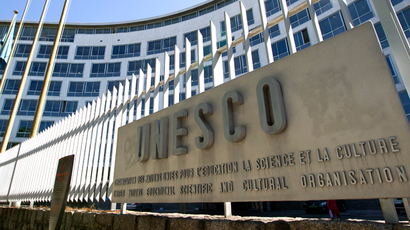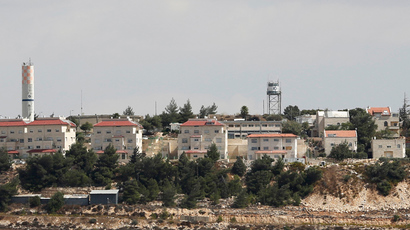American Studies Association backs academic boycott of Israel

The American Studies Association (ASA) leadership is pushing a plan to boycott Israeli universities, saying that Palestinian students and scholars currently face severe obstructions to their right to education “due to the occupation.”
The resolution was passed unanimously by the association’s
20-member national council – composed of elected representatives
from the general ASA membership.
ASA president Curtis Marez said the “boycott is the best way
to protect and expand academic freedom and access to education.”
“The Resolution recognizes that, due to the Occupation,
Palestinian students and scholars currently face severe
obstructions to their right to education through ‘restrictions on
movement and travel that limit their ability to attend and work
at universities, travel to conferences and to study
abroad,’” the ASA said
in a statement published on its website.
Noting a United Nations report which outlined how the Israeli
“occupation of Palestine has impacted students ‘whose
development is deformed by pervasive deprivations affecting
health, education and overall security,’” the ASA opted to
“honor the call” for a boycott of Israeli universities
“as a means of showing solidarity with Palestinians.”
The council, however, said it would seek the endorsement of the
group’s 5,000 members via an electronic vote. If a majority does
not vote to endorse the boycott resolution by December 15, the
national council said it would withdraw the resolution and
consider alternative steps.
The boycott will not likely be binding on the association’s
individual members, and will therefore only affect the activities
of the ASA as an organization.
Chartered in 1951, the ASA boasts 2,200 library and other
institutional subscribers, along with its 5,000 members. The
group describes itself as being “devoted to the
interdisciplinary study of American culture and history.”
The association’s vote on Wednesday follows the April endorsement
of the academic boycott by the Association for Asian American
Studies (AAAS).

AAAS president Mary Yu Danico said earlier this year that the
association would "discourage partnerships with Israeli
academic institutions, whether they’re curriculum partnerships or
study abroad partnerships, because that would be becoming
complicit with the discriminatory practices of Israeli
institutions.
“We would be encouraging faculty, staff and students to forge
alliances with the Palestinian faculty and Palestinian students
who now have so much difficulty engaging in conversations with
scholars from the rest of the world,”
he added.
Like the ASA, the AAAS will not prohibit collaboration with
individual Israeli academics, since the boycott only targets
academic institutions.
The respective boycotts come after the American Association of
University Professors’ journal published an issue earlier this
year where almost all the articles were in favor of an academic
boycott of Israel.
Both resolutions arose in response to the call for the Boycott,
Divestment and Sanctions (BDS) campaign launched by Palestinian
civil society groups in 2005. The global campaign, which includes
academic boycotts against Israel, aims to use economic and
political pressure to force an end to Israeli occupation of
Palestinian lands.
The US Campaign for the Academic and Cultural Boycott of Israel,
meanwhile, was founded in early 2009 following Israel’s Operation
Cast Lead in Gaza. Since then, it has been endorsed by 963
faculty members across the US.

Wesleyan University’s J. Kehaulani Kauanui, a member of the ASA National Council, said that supporters of Israel overlooked the connection between Israeli and US settler colonialism, which she says “is not merely analogous, but is shaped from many of the same material and symbolic force.”
“The American perception that Israel is ‘exceptional’ is
bolstered and bankrolled by US policy and military aid, while
also secured through the persistent myth of American
exceptionalism that denies the colonization of indigenous peoples
here,” news website Mondoweiss cites him as saying.
Geri Palast, managing director of the Israel Action Network, which organizes pro-Israel activism on US campuses, told the Jewish Telegraphic Agency in the run-up to the vote that the ASA meeting was expected to be another victory for the BDS campaign. Palast said the reason was partially because the American studies field is dominated by left-leaning academics who tend toward tough critiques of what they see as US-enabled imperialism.
“My concern about some of these smaller academic associations is that they get amplified out of proportion,” Palast said.
David Lloyd, a professor of English at the University of California, Riverside, said that despite claims to the contrary, such boycotts were a means of ending a de facto censorship of Israel on US universities.
Writing for Electronic Intifada, Lloyd said the ASA meeting “was a clear indication that the time of fear and of the blockade on debate may be over — and that there is a new climate in which critical discussion of Israel’s policies towards Palestine will no longer be taboo.”





